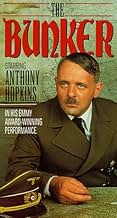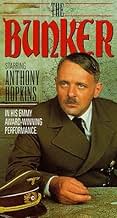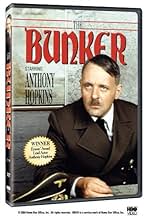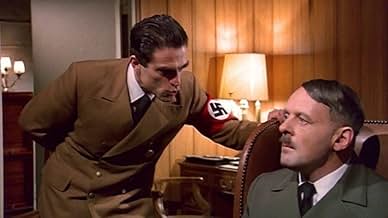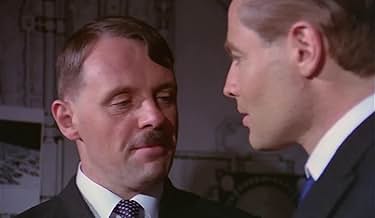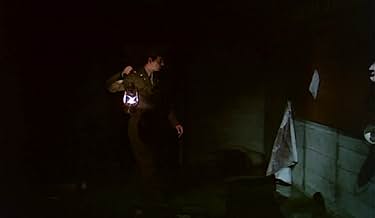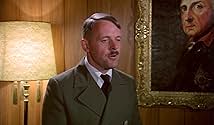Füge eine Handlung in deiner Sprache hinzuDramatization depicting the events surrounding Adolf Hitler's (Sir Anthony Hopkins) last weeks in and around his underground bunker in Berlin before and during the battle for the city.Dramatization depicting the events surrounding Adolf Hitler's (Sir Anthony Hopkins) last weeks in and around his underground bunker in Berlin before and during the battle for the city.Dramatization depicting the events surrounding Adolf Hitler's (Sir Anthony Hopkins) last weeks in and around his underground bunker in Berlin before and during the battle for the city.
- Regie
- Drehbuch
- Hauptbesetzung
- 1 Primetime Emmy gewonnen
- 1 Gewinn & 2 Nominierungen insgesamt
- Gard SS #1
- (as George Chorafas)
Empfohlene Bewertungen
Of most interest are the various performances and the manner in which the various personalities are portrayed. Anthony Hopkins' work as Adolf Hitler was very good - especially considering the difficulties involved in playing such a complex and controversial subject. I thought Hopkins nailed the emotional complexity of the man - deliberately hiding himself from the realities of the War, calmly sitting down to tea with his secretaries one minute, then launching into a deranged tirade against his generals the next, addicted to drugs administered by his personal physician. Those who did makeup for this also got Hopkins to look the part - well not perfectly, but pretty close. Where I thought Hopkins missed the mark a bit was in Hitler's physical state. Aside from some trembling, Hopkins' Hitler actually looked pretty healthy. Other actors have to be looked at as well though, because this movie isn't really about Hitler - it has more to do with how the various personalities involved interacted with Hitler.
Much of the movie revolved around Nazi architect Albert Speer. Richard Jordan handled the part well, although the portrayal of Speer was interesting - probably unavoidably so, since Speer was almost as complex a character as Hitler. In the movie, Speer comes across as basically a good guy, fighting against Hitler's insane plans. There's truth to that view, but it's too limited. Speer was a devoted disciple of Hitler, and his actions against Hitler began only when it became obvious that Germany would lose the war. For Speer, as long as Germany might win, the horrors of Nazism seemed acceptable. Something was lacking in Cliff Gorman's portrayal of Joseph Goebbels. A lot was right - the portrayal of Goebbels' fanatical devotion to Hitler and Nazism, his rabid anti-semitism and his cold as ice attitude - to the point of killing his own family without a second thought simply because he felt that without Hitler, there was no reason for any of them to live. Still, something about Gorman as Goebbels didn't work for me. He just didn't look the part, and I could never really equate the voice with Goebbels either. The third figure of significance was Martin Bormann, portrayed by Michael Lonsdale. Lonsdale was good here. Bormann was a rather shadowy character, and Lonsdale portrayed him that way. You could never really be sure what Bormann's priority was here - getting out of the bunker or staying loyal to Hitler. In fact, that's accurate, because above everything else, Bormann's main preoccupation was with power - whether represented by Hitler or someone else.
Largely missing from this account of these last days in the bunker (although it does pop up in the end) is the rather morbid and completely unreal question of who would succeed Hitler - as if there was going to be anything to succeed to. As I understand it, that was a rather serious issue in the bunker in those last days and weeks; it gets largely passed over in this movie. Basically, however, this is very well done. I particularly liked the last scene, when the machinist Hentschel (Martin Jarvis) throws papers in disgust at the radio when it announces Hitler's heroic death, "fighting to the last breath against Bolshevism," when Hentschel knew full well that Hitler had cowardly committed suicide and left everyone else to fend for themselves. Overall, I give this a 7/10
But just little thing, about characterizations of Adolf Hitler all over the years.
I you closely Watch footage film showing the dictator, the real one, you'll notice that his hair - at least in the last years of his life - did not fall on his forehead, the left side. It was ONLY in the early years, during his rise to power. And curiously, in all films - I must admit although that I don't exactly remember the Bruno Ganz portray - Hitler is shown with his hair falling on the left side of his forehead. I have always wondered why... And I guess I found out. It's only a way to hide the lack of resemblance between the actor playing Hitler and the Führer himself. Because in all memories Hitler had his hair falling on the left side of his forehead. But that just remains a little detail, that DOESN'T NOT point out any flaws in the performances and the quality of this little TV gem.
The picture is correctly based on real events, adding more details , the deeds happened of the following manner : ¨Fuehererbunker¨(Leader's Bunker)is the subterranean headquarter below the Chancellery and its garden in Berlin where Hitler (Anthony Hopkins) spent his last days, from April 20 to 30, 1945. It was constructed during WW2 some 50 feet below the ground. It could be reached through the New Chancellery by descending a stairway from the butler's pantry. There were two levels, On the upper level was a dining passage separating six rooms on each side. At the end of the central passage a curved stair led down to Hitler's own deeper bunker. This area had seventeen rooms , all small, cramped , and uncomfortable : Hitler's suite of three rooms, a map room used for conferences, the dressing room and bedroom of Eva Braun(Susan Blakely), the bedroom of Dr Paul Joseph Goebbles(Cliff Gorman) and wife(Piper Laurie),the rooms of Dr Ludwig, lavatories and bathrooms, an emergency telephone exchange, a drawing room, guardroom, cloakroom and a dog bunker for Hitler's Alsatian bitch named Blondi, with her four puppies. Hitler spent hours before giant war maps, shifting colored pins about to locate units that no longer existed. By this time he was in a state of extreme nervous exhaustion : although only fifty-six, he moved as if he were prematurely senile. His health grew even worse the ministrations of his doctors(Frank Gatliff, Morris Perry). With the exception of Goebbles and Martin Bormann(Michael Londsdale), his secretaries and several others, his lieutenants began to desert him. He denounced Herrmann Goering(David King)for trying to usurp his leadership and Heimrich Himmler (Michael Sheard) for seeking to negotiate with the count Bernadotte and Allied. Albert Speer (Richard Jordan) his minister of Armaments and War Production , refused to carry out his orders for a scorched-earth policy. At last acknowledge defeat, the Fuehrer decided to leave the world in a gesture of Wagnerian self-immolation. In the early hours of April 29, 1945, he married Eva and immediately afterward dictated his last will and political testament, in which he justified his life and work. The next day he retreated into his suite and shot himself while Eva took poison to end her life. In accordance with his instructions, the bodies were dumped into a trough in the Chencellery garden,doused with gasoline and burned. From April 22 to May 1, 1945 , the following were present in the Bunker: Gen Keitel(John Paul), Gen. Hans Guderian(Brain Villa) , Col.Von Below(Julian fellows), Gen. Alfred Jodl(Steedman) , Major Gen. Rattenhuber(David Swift), Lieutenant Genen Fegelein (Terrence Hardiman), Dr. Ludwig Stumpfegger , among others.
Wusstest du schon
- WissenswertesAfter viewing the dailies, one of the producers complained that Anthony Hopkins' portrayal of Adolf Hitler was too sympathetic. Hopkins replied that his portrayal was based on the premise that ultimately even Hitler was also human, and that's what's so horrific about him.
- PatzerAt the very end of the movie, the SS man/switchboard operator, Misch is seen talking to mechanic Hentschel while preparing to flee "The Bunker". The rifle Misch has shouldered is a Russian Mosin Nagant; he would have been carrying the German Mauser of which plenty would have been available with all the wounded in the proximity. It's unlikely anyone would have taken a Russian weapon down into Hitler's Bunker.
- Zitate
Albert Speer: The war is lost.
Adolf Hitler: [shouting] The war is not lost! The war is not lost! The war will never be lost! We're gonna beat'em, we're gonna beat'em all!
- VerbindungenFeatured in The 33rd Annual Primetime Emmy Awards (1981)
Top-Auswahl
Details
Zu dieser Seite beitragen


